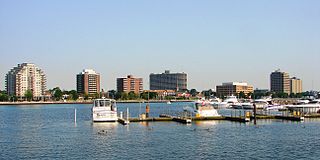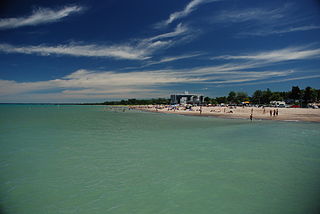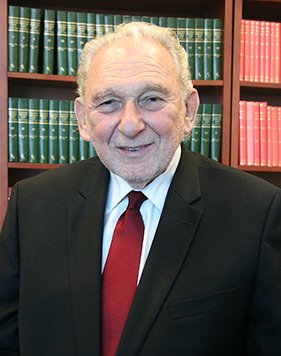
Sarnia is a city in Lambton County, Ontario, Canada. It had a 2021 population of 72,047, and is the largest city on Lake Huron. Sarnia is located on the eastern bank of the junction between the Upper and Lower Great Lakes where Lake Huron flows into the St. Clair River in the Southwestern Ontario region, which forms the Canada–United States border, directly across from Port Huron, Michigan.

Michael Deane Harris is a Canadian retired politician who served as the 22nd premier of Ontario from 1995 to 2002 and leader of the Progressive Conservative Party of Ontario from 1990 to 2002. During his time as party leader, he heavily nudged the Ontario PC Party to Blue Toryism, advocating for the "Common Sense Revolution", his government's program of deficit reduction in combination with lower taxes and budget cuts.

The Ontario Provincial Police (OPP) is the provincial police service of Ontario, Canada. Under its provincial mandate, the OPP patrols provincial highways and waterways, protects provincial government buildings and officials, patrols unincorporated areas, and provides support to other agencies. The OPP also has a number of local mandates through contracts with municipal governments, where it acts as the local police force and provides front-line services.

Lambton County is a county in Southwestern Ontario, Canada. It is bordered on the north by Lake Huron, which is drained by the St. Clair River, the county's western border and part of the Canada-United States border. To the south is Lake Saint Clair and Chatham-Kent. Lambton County's northeastern border follows the Ausable River and Parkhill Creek north until it reaches Lake Huron at the beach community of Grand Bend. The county seat is in the Town of Plympton-Wyoming.

Kettle & Stony Point First Nation comprises the Kettle Point reserve and Stony Point Reserve, both located approximately 35 kilometres (22 mi) northeast of Sarnia, Ontario, Canada, on the southern shore of Lake Huron. The reserves serve as the land base for the Chippewas (Anishnaabeg) of Kettle and Stony Point First Nation.
Chris Hodgson is a former politician in Ontario, Canada. He was Reeve of Dysart country in 1993, and warden of Haliburton. He was a Progressive Conservative member of the Legislative Assembly of Ontario from 1994 to 2003 representing the ridings of Victoria—Haliburton and Haliburton—Victoria—Brock. He was a cabinet minister in the governments of Mike Harris and Ernie Eves, serving variously as Minister of Northern Development and Mines, Chair of the Management Board of Cabinet and Deputy Government House Leader, and Minister of Municipal Affairs and Housing.
Marcel Beaubien is a former politician in Ontario, Canada. He was a Progressive Conservative member of the Legislative Assembly of Ontario from 1995 to 2003 and unsuccessfully sought election to the House of Commons of Canada as the Conservative candidate in the federal riding of Sarnia-Lambton in 2004.
Saugeen First Nation is an Ojibway First Nation band located along the Saugeen River and Bruce Peninsula in Ontario, Canada. The band states that their legal name is the "Chippewas of Saugeen". Organized in the mid-1970s, Saugeen First Nation is the primary "political successor apparent" to the Chippewas of Saugeen Ojibway Territory; the other First Nation that is a part of Chippewas of Saugeen Ojibway Territory is Cape Croker. The Ojibway are of the Algonquian languages family. The First Nation consist of four reserves: Chief's Point 28, Saugeen 29, Saugeen Hunting Grounds 60A, and Saugeen and Cape Croker Fishing Islands 1.

The Progressive Auto Sales Arena is a 5,500-capacity (4,118-seated) multi-purpose arena in Sarnia, Ontario, Canada. It is located on the campus of Lambton College and opened in September 1998. The Progressive Auto Sales Arena is currently home to the Sarnia Sting OHL ice hockey team. The Sarnia Legionnaires (1969–) Junior B hockey club holds its training camp at the facility before moving to Sarnia Arena for its regular schedule.

One Dead Indian: The Premier, the Police, and the Ipperwash Crisis is a book by Canadian investigative journalist Peter Edwards about the 1995 Ipperwash Crisis and the shooting death of aboriginal land claims protester Dudley George by the Ontario Provincial Police on September 7, 1995. It was first published by Stoddart in 2001 and reprinted several times and published as an ebook.
The Ipperwash Crisis was a dispute over Indigenous land that took place in Ipperwash Provincial Park, Ontario, on September 4, 1995. Several members of the Stoney Point Ojibway band occupied the park to assert claim to nearby land which had been expropriated from them during the Second World War.

Lambton Shores is a municipality in Lambton County, Ontario, Canada, that is on the southern shores of Lake Huron.
The St. Clair Parkway, historically referred to as the River Road, is a scenic parkway in the Canadian province of Ontario. It travels alongside the St. Clair River from west of Wallaceburg to Sarnia, a distance of 41.8 kilometres (26.0 mi). It formed a portion of the route of Highway 40 until it was bypassed by an inland route that opened in the mid-1970s. The St. Clair River Parkway Commission maintained the route from 1966 until 2006, when it was disbanded and responsibility over the parkway transferred to Chatham-Kent and Lambton County, both of which designate the route as County Road 33. The communities of Port Lambton, Sombra, Courtright, Mooretown, Corunna and Froomfield are located along the parkway, all early settlements of the 19th century.

Lambton—Kent—Middlesex is a provincial electoral district in southwestern Ontario, Canada. It elects one member to the Legislative Assembly of Ontario.
Maynard Donald "Sam" George was a Canadian native rights activist. His brother Dudley George was killed following a standoff with Ontario Provincial Police during the Ipperwash Crisis. Sam played an important role in forcing a judicial inquiry, the Ipperwash Inquiry into the events at Ipperwash.
WeirFoulds LLP is a Canadian law firm based in Toronto, Ontario. The firm specializes in litigation, corporate, property and government law. It is one of Canada's oldest law firms.
Military Camp Ipperwash is a former Canadian Forces training facility located in Lambton County, Ontario near Kettle Point. On April 14, 2016, it was returned to the Chippewas of Kettle and Stony Point First Nation.

Sidney Bryan Linden is a former Chief Judge of the Ontario Court of Justice and a judicial reformer and administrator in the province of Ontario, Canada.
The Ipperwash Inquiry was a two-year public judicial inquiry funded by the Government of Ontario, led by Sidney B. Linden, and established under the Ontario Public Inquiries Act (1990), which culminated in a four volume 1,533-page Ipperwash Inquiry Report released on May 30, 2007.

The Anishinaabemowin language belongs to the Central Algonquian language family, and is located in Kettle and Stony Point First Nation. This name variation stems from the relation between the name of the language and the name of the people speaking it, as Anishinaabemowin is spoken by the Anishinaabe. It is also a combination of Pottawatomi and Ojibway. There is a population of 936 people living in Kettle and Stony Point, and of those 936 less than 10 people are fluent speakers of the language. Kettle and Stony Point is located in Canada, in the province of Ontario and in the municipality of Lambton County.












